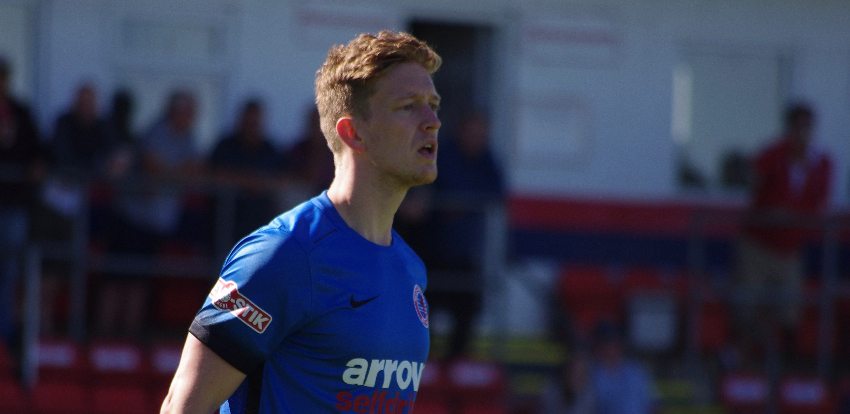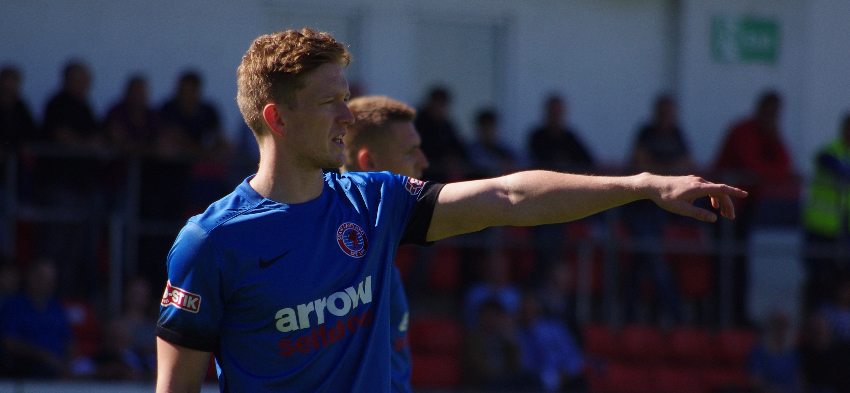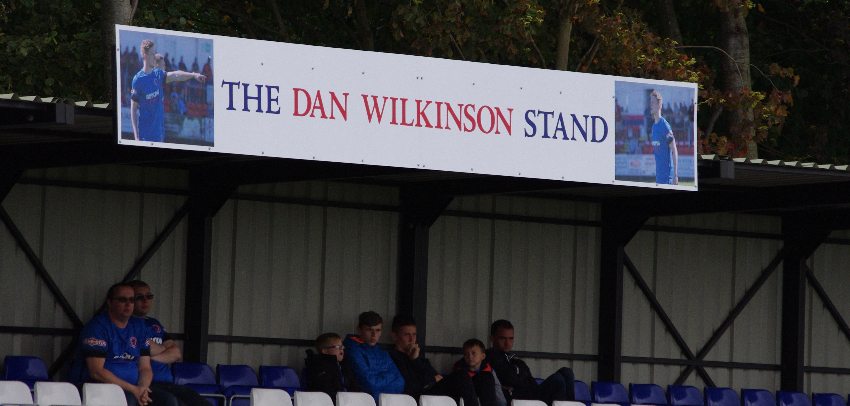In the first of a series of interviews with current and former managers, Non League Yorkshire speaks to Eric Gilchrist about his career and what he thinks is most important about the way to manage in Non League Football.
Clubs managed: Liversedge (1997-2000), Ossett Albion (2000-11), Ossett Town (caretaker 2012) Liversedge (2012-13)
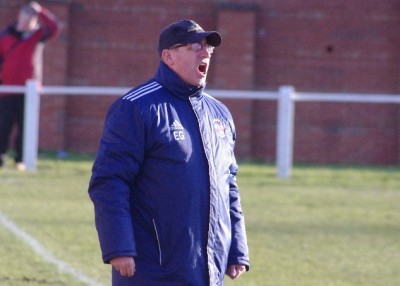
Eric Gilchrist has devoted over 30 years of his life to Non League football management
Dedication, loyalty, passion and a will to win are four key themes that run right through Eric Gilchrist’s managerial career. Gilchrist, one of the most straight-talking and well known faces on the Non League circuit, has a solid CV which spans back over 20 years from the moment he gave up playing after stints with Barnsley, Frickley Athletic and Worksop Town because of rheumatoid arthritis.
“I took all my licenses when I was younger and I converted them to UEFA B and A licenses in the late nineties and I always had an interest in managing and coaching so it seemed like natural progression to me,” says Gilchrist, who combined managing with a full-time job with Wakefield Council.
Although he’s unlikely to take up a position as a number one again, he remains as active as ever, dividing his time between helping current Ossett Albion boss Richard Tracey and scouting for Premier League side Swansea City, searching for the next Jamie Vardy.
Gilchrist is synonymous with Albion, but his initial steps into managerial steps can be traced back to Wakefield City in the Yorkshire Old Boys League, whose representative team he also controlled in the days before mobile phones. He also coached prolifically in the United States.
“Pure chance” led him to Liversedge as Martin Wilkinson, the former assistant to Leeds United legend Allan Clarke at Barnsley, recommended him for the role. He had played for Wilkinson in the 1980s and had kept in touch with him through playing for the Leeds old boys team. It is knowing people in the right places that Gilchrist believes is a key weapon for a Non League manager.
“I have to say your network of contacts is probably the most important part of it because if you haven’t got that phone number for someone to call and say ‘look I need a centre half or centre forward’, I think it is really difficult,” Gilchrist tells Non League Yorkshire. “I’ve seen managers struggle because of that.
“I think a lot of managers don’t go out and get those contacts. They don’t go watch games and they don’t talk to other managers. I think if you don’t network then you’re going to make life difficult for yourself.
“I’ve seen managers who have upset other managers along the way and that’s been their downfall in my opinion. You can guarantee at some point you’re going to require a favour from a manager and if you have upset people then you’re not going to get helped out.
“I can go back to when I started at Liversedge and more so Ossett Albion, I can name three people who if I had not got their support, advice and guidance as a young manager, then I think I would have struggled to progress as a manager. That’s Ronnie Glavin, John Reed and Brian France. I took a lot of advice from them and in some cases a player.
“Making contacts is my advice to young managers and I also think that some think that it is just going to be a Saturday afternoon and a couple of nights a week job. You need to forget that because this is a seven day a week and 24/7 hours a day job.
“I’ve known me for example go to Tow Law Town in midweek to scout them when we got them in the FA Cup or Vase at Ossett Albion. I’ve been to Marske, Marine in midweek, just to watch games. I always say if you’re willing to put the hours in then you have a chance of having success.”
It is no surprise that Gilchrist needed help and advice when he entered Clayborn for the first time in November 1997 as Liversedge were 16 points adrift after just one win all season. Only 19 games were left.
Slowly, but surely, Gilchrist, whose side also finished as runners-up in the West Riding County Cup, turned them around to take the survival battle to the final day.
“I’ll never forget that day,” he says. “We were drawing 0-0 at Armthorpe Welfare going into the final few minutes which was good enough to stay up. Armthorpe had two great chances in the last minute and the goalkeeper Richard Biddy made two of the best saves I have ever seen.
“That kept us up and guess who went down instead of us? Curzon Ashton.”
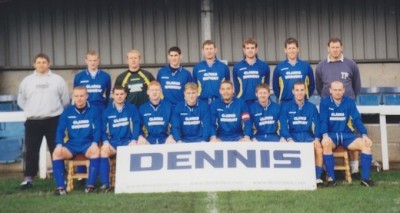
Liversedge 1999-00: Eric Gilchrist (Manager), Andy Yates, Richard Bibby, Dave Thomas, Chris Birkinshaw, Danny Toronczak, Simon O’Hara and Tony Passmore (Assistant Manager). Front Row: Andy Dodsworth, Paul Sweeney, Richard Dyson, Kevin Blanchard, Michael Carter, James Glover, Paul Slater and Andy Kenton.
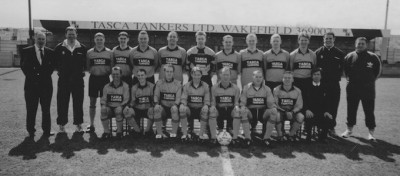
Eric Gilchrist with his first Ossett Albion team in 2000-01
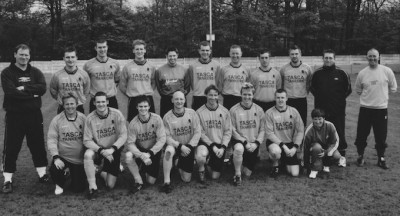
Ossett Albion: 2004-2005 Back row, left to right: Tony Passmore (Assistant Manager), Mark Mierzwinski, Sean Hazelden, Jon Wordsworth, Mick Clark, Danny Toronczak, Mick Norbury, Mark Townsend, Richard Stack, Eric Gilchrist (Manager) and Nigel Yarrow (Coach). Front row: Dave Dodd, Andy Farrell, Steve Downes, Gary Duffty, Guy Dodd, Michael Senior, Dave Dickinson and Nicky Davies (Physio).
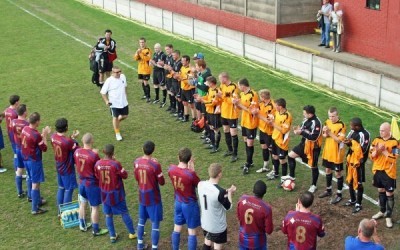
Hero status: Eric Gilchrist gets the guard of honour in his final match as Ossett Albion manager in 2011
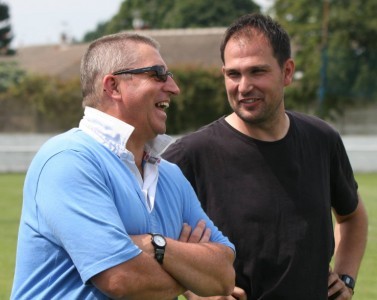
Eric Gilchrist (left) currently helps Ossett Albion boss Richard Tracey as well as scouting for Swansea City. Photo: John Hirst
Watch Eric Gilchrist in his pomp at Ossett Albion ahead of a 2-1 win over eventual champions Bradford (Park Avenue). A win achieved even after captain Jon Wordsworth was sent off after just 23 minutes. Warning: There is strong language.
Within 18 months, Gilchrist turned ‘Sedge into promotion candidates, in turn attracting the attention of Albion in the summer of 2000. This was the start of an eleven love-affair with them.
He got them up into the Northern Premier League in his first season after Brigg Town failed their ground grading. They got relegated straight back down, but Gilchrist guided them at the first attempt. Winning the title because his side scored three more goals than second-placed Eastwood Town, who were level on points and goal difference with them.
Albion almost broke in the NPL Division One play-offs on several occasions in the following few seasons with a team that would run through brick walls for their manager. His last two seasons were difficult as Albion needed relegation reprieves, but he did spend them both as chairman as well to help the club through a few problems.
“The spell I had from 2005 and 2008 and although it coincided with the best budgets I had, we had some really good players,” he admits.
“We had a good nucleus from Barnsley such as Ryan White, Darren Utley, Kyle Cook. We had Dave Syers and everyone knows where he went onto play. We had some good forwards like Danny Toronczak, Micky Norbury and it is like anything, if you have good players you have a good chance of doing well.
“I always felt we were a couple of top players short of being able to push our way out of the old UniBond One, but I wouldn’t change anything.”
Since his original and emotional departure from Albion, he spent time as Phil Sharpe’s assistant at Ossett Town. He also stepped into the breach for a few months when Sharpe was sacked.
Gilchrist chose not to apply for the permanent position in the summer of 2012 and instead returned to Liversedge. He was doing well until a breakdown in trust with the club’s committee in October 2013 led to his departure.
But despite that exit, no-one can question his loyalty and as Gilchrist points out: “I’ve always said that I will never leave a club mid-season to go to another club and I have stuck to my word for over 20 years.”
A return to help Richard Tracey rescue Albion from relegation was too much of a pull to turn down in January 2013 and he’s still there, Swansea work permitting.
“Non League is my life and it has been for 20 years and I wouldn’t change it now,” he adds.
“There was probably a spell at Albion when I was linked one or two higher up jobs, but I lived in Horbury which is five minutes from the ground and I worked with some great people like Nev Wigglesworth so there never was a reason to leave.
“I think my time as a manager is gone now as I haven’t got the time or effort. It would have to be a really big job.
“I help Richard (Tracey) at Ossett Albion when time allows me, but since I retired from full-time employment last October, I have been scouting for Swansea City. The chief scout Dave Ledbetter is a friend of mine and we had a conversation about a player going down on trial and I soon got involved with him.
“I’m looking at Non League and under 21s at the minute. I think everyone in football is looking for the next Jamie Vardy and I’m doing exactly the same. Everyone had jumped on the bandwagon to make sure they don’t miss out on the next one. There has be other players out there like that in Non League football and I’ve seen one or two in the last couple of months that given an opportunity may do something similar.”
He might not be in the main hot-seat anymore, but there’s no question that the same traits from his career remain.

